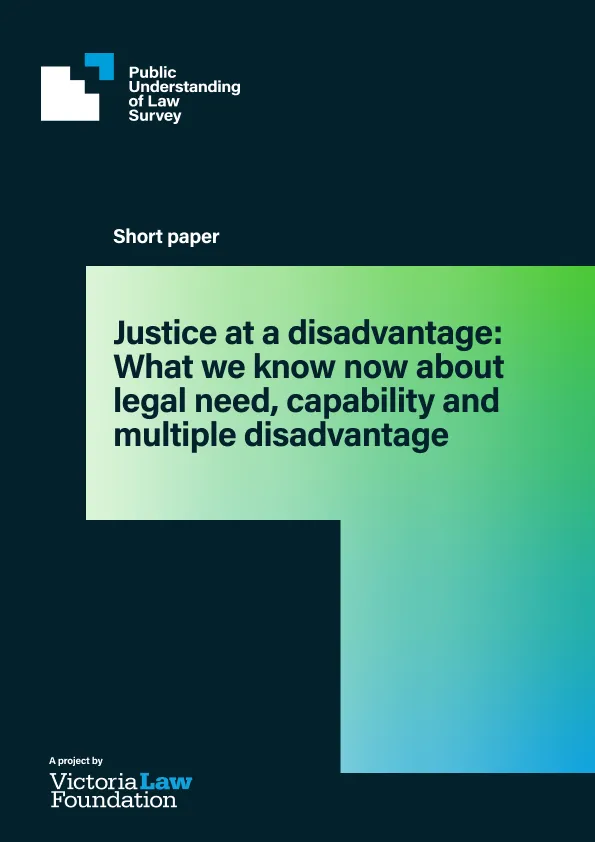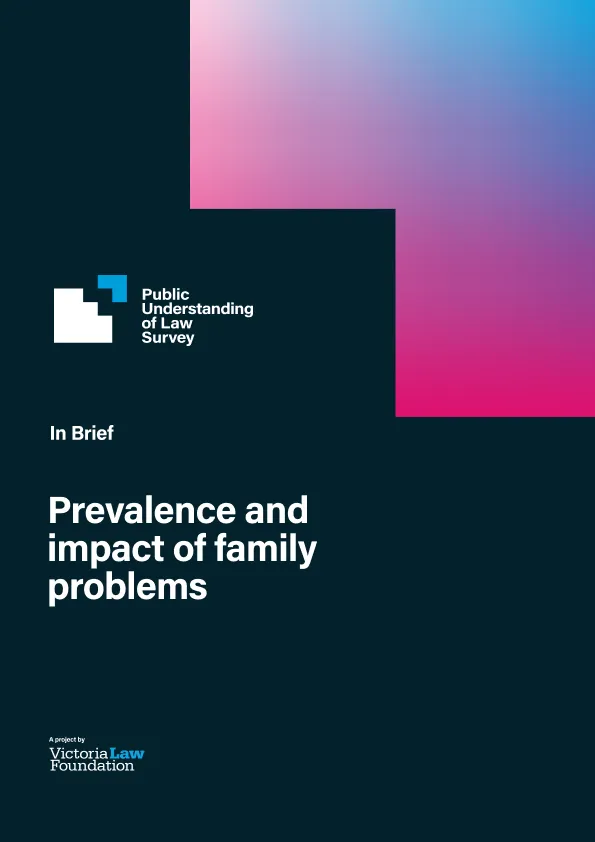Law… What is it Good For?
How People see the Law, Lawyers and Courts in Australia.

We live in a ‘law thick’ world
A complex web of law touches every aspect of our lives. Law defines our consumer rights. It regulates our employment conditions, pay and superannuation. It sets out the responsibilities of landlords, tenants, mortgagors and mortgagees, and reaches deep into every aspect of our lives.
But to what extent do people recognise the relevance of law, and how to use it to resolve everyday issues? To help people navigate this ‘law-thick’ world, we need to understand what their starting point is. People won’t seek legal assistance if they don’t recognise that they have a legal problem.
About the research
The report draws on findings from our recently conducted Community Perspectives of Law Survey, an Australia-wide survey of over 1800 people which explored people’s understanding of the relevance of law and, in particular, whether lawyers are seen as important in relation to everyday scenarios.
Those scenarios included the kinds of problems that arise in employment, renting, and consumer contracts and included issues such as family violence and neighbourhood disputes.
The research also explored people’s perceptions of the accessibility of courts and lawyers.
Download
How People see the Law, Lawyers and Courts in Australia.

Key findings
Your perceptions of the law are related to your exposure to it

Those exposed to negative second-hand or anecdotal accounts of courts demonstrated a significantly lower perception of their accessibility, while exposure to positive anecdotal accounts were associated with particularly large increases in perceptions of accessibility.
Your perceptions of the law are related to your exposure to it

Those who had personally attended/contacted court, and particularly those who felt the process was fair perceived courts as more accessible. Similarly, those who had used lawyers and been satisfied with the help also saw courts as significantly more accessible.
Demographics matter

For people reporting a serious mental illness, both courts and lawyers were seen as significantly less accessible than they were for other respondents. But these people were far more likely to see the law as relevant, and lawyers as more important in addressing problems, even less serious ones.
Demographics matter

Non-English speakers felt a lawyer was more important than others for problems dealing with a figure of authority. Respondents who spoke a language other than English at home, and those with limited digital capability both regarded lawyers as significantly less accessible.
Demographics matter

Female respondents indicated the law was more relevant and lawyers more important for problems involving power imbalances and gender dynamics.
Demographics matter
The law was considered less relevant to problems for people who live outside capital cities; among people with fewer educational qualifications; and for those who speak a language other than English at home.
Not all legal problems seen as legal, and courts and lawyers not always seen as accessible

As well as the type of problem, the severity of a problem had a bearing on whether law was seen as relevant and lawyers important. For example, a more severe workplace injury or a higher amount of money in dispute increased the likelihood that law and lawyers were perceived to be relevant or important for an otherwise identical scenario.
Not all legal problems seen as legal, and courts and lawyers not always seen as accessible

Courts were typically regarded as ‘inaccessible’ - complex, costly, slow and hard to understand. Lawyers are largely viewed as accessible, though less so where questions referred to cost, complexity or speed.
Not all legal problems seen as legal, and courts and lawyers not always seen as accessible

Even though all scenarios had a legal dimension, not all problems were identified that way by respondents. Some problems were almost universally viewed as legal or requiring a lawyer, and others were not.
Implications and insights
Not all problems were seen as ‘legal’, and courts and lawyers were not always viewed as accessible
- Even though all scenarios had a legal dimension, not all problems were identified that way by respondents. Some problems were almost universally viewed as legal or requiring a lawyer, and others were not.
- Courts were typically regarded as ‘inaccessible’ – complex, costly, slow and hard to understand. Lawyers were largely viewed as accessible, though less so where questions referred to cost, complexity or speed.
- As well as the type of problem, the severity of a problem had a bearing on whether law was seen as relevant and lawyers important. For example, a more severe workplace injury or a higher amount of money in dispute increased the likelihood that law and lawyers were perceived to be relevant for an otherwise identical scenario.
- Problems where the law was considered relevant were typically the same as those where a lawyer was considered important. However, in general the law was considered relevant more often than lawyers were considered important.
- For some typically less serious problems, lawyers were seen as far less important than the law. But in some more serious cases, lawyers were regarded as more important than law was relevant.
Demographics mattered
- The law was considered less relevant to problems for people who lived outside capital cities; among people with fewer educational qualifications; and for those who spoke a language other than English at home.
- Female respondents indicated the law was more relevant and lawyers more important for problems involving power imbalances and gender dynamics.
- Non-English speakers felt a lawyer was more important than others for problems dealing with a figure of authority. Respondents who spoke a language other than English at home, and those with limited digital capability both regarded lawyers as significantly less accessible.
- For people reporting a severe mental illness, both courts and lawyers were seen as significantly less accessible than they were for other respondents. But these people were far more likely to see the law as relevant in addressing problems, particularly family violence, and lawyers as more important in addressing problems, even less serious ones.
Exposure to law related to your perceptions
- Personal experience of courts and lawyers was uncommon, but generally positive, while second-hand accounts (from friends, family or colleagues) were more common, but more negative. Both were strongly related to how people viewed the relevance of law, importance of lawyers, and the accessibility of both courts and lawyers.
- Across our problem scenarios, those with negative direct experience of lawyers saw the law as less relevant, but those who could recall positive second-hand accounts of lawyers saw the law as more relevant than others.
- If you have had a positive experience with a lawyer, you were more likely to see them as accessible, however the reverse was also true. Negative experience with lawyers related to a strong perception that they were less accessible. Similarly, those reporting experience of unfair court processes saw lawyers as significantly less accessible.
- However, a negative view of courts did not diminish the importance of lawyers in our problem scenarios: those with first-hand experience of courts, and particularly those who felt the process was unfair, tended to feel lawyers were more important.
- Those who had personally attended/contacted court, and particularly those who felt the process was fair, perceived courts as more accessible. Similarly, those who had used lawyers and been satisfied with the help also saw courts as significantly more accessible.
- Those exposed to negative second-hand or anecdotal accounts of courts demonstrated a significantly lower perception of their accessibility, while exposure to positive anecdotal accounts were associated with particularly large increases in perceptions of accessibility.
- Positive second-hand accounts of lawyers related to an increase in the perceived accessibility of lawyers and negative accounts to a decrease.
Where next?
Findings on how problems are perceived offer valuable insights to improve public legal education, but most
importantly, to help services respond to and harness people’s capability. This might involve problem noticers (e.g. an intermediary in a non-legal setting), co-location, integrated services and outreach, all of which can negate the requirement of the individual to identify ‘law’ in problems in order to access justice.
Findings on accessibility of courts and lawyers show the potential for success with programs which increase transparency, enhance understanding, and address negative perceptions of fairness and accessibility.
For legal services, this might cover clear pricing, outreach, non-legal branding, well recognised entry points and integrating services. For courts, this could include education programs, transparent communication and in-court programs (e.g. navigator schemes), helping the public through a stressful process that they typically feel is inaccessible.
These findings reinforce the importance of ‘bottom-up’ access to justice policy: service design that starts and ends with the needs and capabilities of users.
Frequently asked questions
Publication resources
Similar publications
You may be interested in these other research publications.



